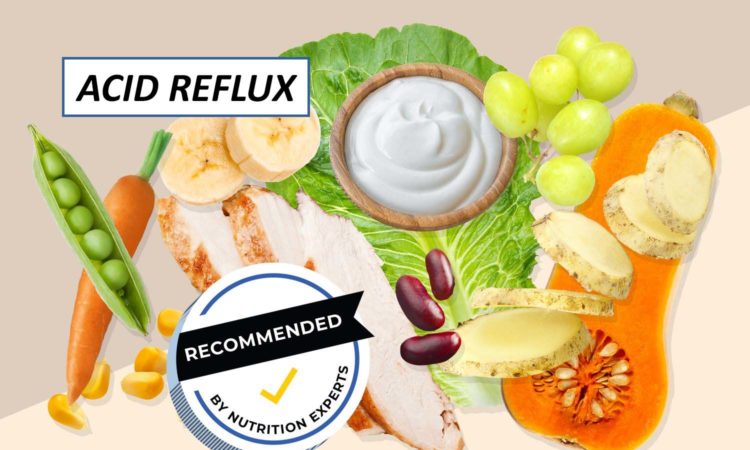
- According to the National Institute of Diabetes and Digestive and Kidney Diseases, 20% of people in the United States have GERD. But what is GERD and why is it important to know more about its relationship to eating?
What is acid reflux & GERD?
- When we eat something, it goes down our food pipe into the stomach. Our stomach secretes very strong acids that start to digest the food.
- The lining of the stomach provides protection against these acids, so as long as the acids stay in the stomach they don’t cause any problem.
- There is a circular muscle – called LES or lower esophageal sphincter – that sites between the stomach and the food pipe. The sole job of this muscle is to stay closed most of the time, making sure nothing from the stomach flows up into the food pipe.
- For certain people, this muscle gets relaxed easily and allows the reflux of stomach acids into the esophagus. This condition is called acid reflux.
- GERD (gastroesophageal reflux disease) is a chronic form of acid reflux. Those who have acid reflux at least twice a week have GERD.
What about acid reflux and eating?
- Even though we don’t know the exact reasons, many people do experience such acid reflux episodes after consuming certain foods.
- While the exact trigger foods vary from person to person, certain foods are more likely to trigger symptoms.
- Knowing these trigger foods can be a big help to prevent an acid reflux attack and its unpleasant symptoms.
Fatty foods
- Fatty foods can cause chest pain in two different ways:
- Fatty foods are very hard to digest. Therefore they stay longer in the stomach, the stomach needs to secrete more acids to properly digest them.
- On top of that, fatty foods also have a relaxing effect on the LES.
- The combination of these two effects makes acid reflux more likely.
Sugary foods
- Too much added sugar can trigger various symptoms and might cause all kinds of chronic diseases, especially in the long term.
- Chest pain, stomach pain, shortness of breath, or sore throat are all possible side effects of excessive sugar consumption, and acid reflux is a possible cause.
- Just like fatty foods, sugary foods also relax the tightness of the LES and make the stomach produce more acid.
- In terms of managing acid reflux, a low-carb diet is especially beneficial for obese and insulin-resistant people.
Caffeine
- Coffee is a very popular drink, but it might be a no-no for acid reflux sufferers because of its caffeine content.
- Caffeine is known for relaxing the LES and is therefore not recommended for people with acid reflux.
- To make things worse, people tend to put sugar and milk into their coffee. As discussed above, added sugar can trigger acid reflux. Milk can also trigger symptoms, as it contains not only sugar (lactose) but fat too.
- If you like to put milk into your coffee, try to avoid full-fat cow milk and use goat milk or plant-based milk.
What foods should you eat with acid reflux?
- Unfortunately, there is no definitive list of foods that never cause symptoms. This varies from person to person. However, there are certain foods that rarely trigger symptoms and are safe for most people with reflux:
- certain fruits, like bananas, dates, figs, peaches, etc.
- certain vegetables, like sweet potato, carrots, beans, green leafy veggies
- high-fiber foods, like whole grains
- probiotics, like buttermilk or yogurt
- low-fat meat, like chicken
Knowing your trigger food is essential if you are suffering from acid reflux. Avoiding these foods or at least limiting your intake might make it easier to manage your condition, sometimes it might even prevent symptoms.

